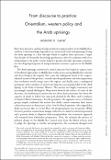Files in this item
From discourse to practice : orientalism, Western policy, and the Arab uprisings
Item metadata
| dc.contributor.author | Gani, Jasmine K. | |
| dc.date.accessioned | 2022-01-11T10:30:10Z | |
| dc.date.available | 2022-01-11T10:30:10Z | |
| dc.date.issued | 2022-01-10 | |
| dc.identifier | 276446466 | |
| dc.identifier | 74ccc117-a15d-4628-ae16-29deca96c1fc | |
| dc.identifier | 85140204839 | |
| dc.identifier.citation | Gani , J K 2022 , ' From discourse to practice : orientalism, Western policy, and the Arab uprisings ' , International Affairs , vol. 98 , no. 1 , pp. 45-65 . https://doi.org/10.1093/ia/iiab229 | en |
| dc.identifier.issn | 0020-5850 | |
| dc.identifier.other | ORCID: /0000-0002-8218-1807/work/106397739 | |
| dc.identifier.uri | https://hdl.handle.net/10023/24637 | |
| dc.description.abstract | Ten years on since the Arab uprisings we are in a position to assess how the nexus between knowledge, discourse and practice had a bearing on the trajectory of the protests. They represented hope and change for millions of Arabs in the region, but to what extent was that the case for onlookers in Europe and the US, and did western discourse on events in the Middle East matter? While the toppling of longstanding dictators was met with jubilation by Arab populations, it conversely created anxiety and fear in many western governments. This was reflected in the shift from an initially celebratory discourse in western commentary to disappointment, pessimism and disavowal of the uprisings. Within a year, op-eds and academic articles were asking whether the ‘Arab Spring’ had turned into an ‘Islamist winter’, reverting to Orientalist narratives about the inevitability of conflict, bloodshed and sectarianism in the Middle East. I argue this discourse had implications for the outcome of the uprisings as ‘latent Orientalism’ translated into ‘manifest Orientalism’ and western states hesitated to support opposition groups they initially encouraged and emboldened. I begin the article with a study of western discourse in the first year of the uprisings, which I then situate within a long durée history of western policy and representation of the Middle East. In the final sections I consider the role of scholarship and think tanks as mediators of Orientalist discourse. | |
| dc.format.extent | 21 | |
| dc.format.extent | 718699 | |
| dc.language.iso | eng | |
| dc.relation.ispartof | International Affairs | en |
| dc.subject | JZ International relations | en |
| dc.subject | T-NDAS | en |
| dc.subject | MCC | en |
| dc.subject.lcc | JZ | en |
| dc.title | From discourse to practice : orientalism, Western policy, and the Arab uprisings | en |
| dc.type | Journal article | en |
| dc.contributor.institution | University of St Andrews. School of International Relations | en |
| dc.identifier.doi | https://doi.org/10.1093/ia/iiab229 | |
| dc.description.status | Peer reviewed | en |
| dc.date.embargoedUntil | 2022-01-10 |
This item appears in the following Collection(s)
Items in the St Andrews Research Repository are protected by copyright, with all rights reserved, unless otherwise indicated.

